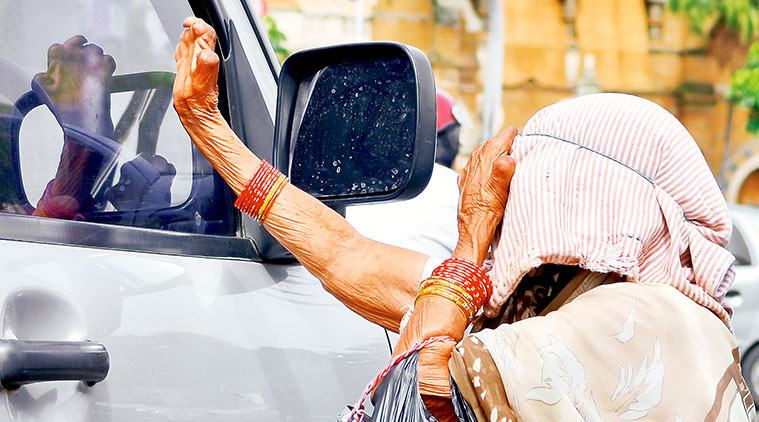The old woman at the signal
In the winter of their lives, the invisible women at traffic junctions.
 Street visions: Encounters with another world. (Source: Getty/Thinkstock Images)
Street visions: Encounters with another world. (Source: Getty/Thinkstock Images)
“Where’s my old lady?” I wonder every morning. It’s been weeks and I haven’t seen her at her usual place at the signal, walking between the vehicles jammed tight together, a makeshift walking stick in hand.
Dead, perhaps, I assume. Just staying put all day on the roads must be a Herculean task, weaving her way through masses of humanity that pass her by without a second glance. Unlike the other old lady who patrols the road opposite — it’s a four-way junction, and three of them are manned by old women — who looks very closely at whatever you give her and will have you know her feelings about the offering, this one is always gentle. She smiles at whatever is placed in her palm, sometimes raising her hand to show her appreciation.
I first noticed her a few years ago, and, as I think of her, I’m suddenly shocked at how time has flown and how nothing has changed for her, and how I’ve done nothing to change it either. She was lighter on her feet then, smiled more, with her eyes. Then she disappeared for a few months, until I spotted her one morning, striding quite fast down another road, a friend in tow, her trusty walking stick tik-tokking at a brisk pace. She looked older, and her long hair that she used to wear in a plait, had been cut short. I assumed that she lived in a “home” close by, and that, as is the norm in these places, her hair had finally been sacrificed to hygiene and ease of maintenance. But this was a long time ago.
Then, just like that, I see her the next morning, walking towards my car, older, and frailer than ever. “How are you?” I ask in Kannada, pressing some loose change in her hand. She says something back in Telugu, which I can’t follow properly. “Telugu?” I ask stupidly, unable to say anything else, and she nods. She says something about her home, then. I know she’s talking about home even though I still cannot understand a word, because of the way she speaks. A nod to something far away, and yet very close, carried around in one’s heart. A shrug of the shoulders that says it’s all over, what to do, and palms raised ever so slightly, asking why, perhaps. A life ending now in a place very far away and very different from where it all began, with no one left to witness it, except herself. I don’t see her after that day, and I hope she’s passed on to a better place.
As for the other old lady, who in spite of her grim look and set jaw, occasionally has a twinkle in her eye when you hand over a bigger note, we have become friendly now. I look out for her, even if I do little else.
The other day I triumphantly pulled out a hundred bucks and put my hand out of the window to attract her attention. She had been sitting on the concrete divider in a yellow-and-white sari, her short white matted hair looking extra windblown, her ankles exposed as the sari is hitched to avoid her tripping over herself. The season had changed and cool winds blew through the day; lovely weather, if one remained in the cocoon of one’s car or home.
She took the note, unfolded it to make sure it wasn’t torn, and then said, “Give one more — I’ll buy this.” She pointed at her sari. I noticed her head shaking as she spoke, indicating her steady deterioration.
I think of her sometimes, this woman, who I have noticed lying on the pavement in a dead sleep when I’m driving back home after work. It’s around 5 pm but she’s oblivious to everything around her and sleeps right there on the footpath. Sometimes at night, when it rains and the thunder wakes me up, I wonder where she may be. I like to think she’s safe in the ground floor of an under-construction building at the street corner where she spends her waking moments. As she walks off slowly, I suddenly notice that blue steel boards have been used to close off the entrance to the ground floor and getting in now is impossible.
I look at the traffic light and there is still sometime to go before we can all push ahead; the car on my left is too close for comfort and I know I must move ahead before it does. I turn towards the building again and am startled to see the old woman resting on the concrete ledge that almost hugs my side of the car; she’s very close and I see she’s trembling.
“Are you cold?” I gesture, suddenly aware of the thin sari, the brown parched skin and how cold the breeze is.
“Very,” she says. The light turns green and I press the pedal. I’ll carry a shawl with me tomorrow, I think. I’ll give it to her when I see her next.
This article appeared in the print edition with the headline ‘Being mortal’
- 01
- 02
- 03
- 04
- 05































